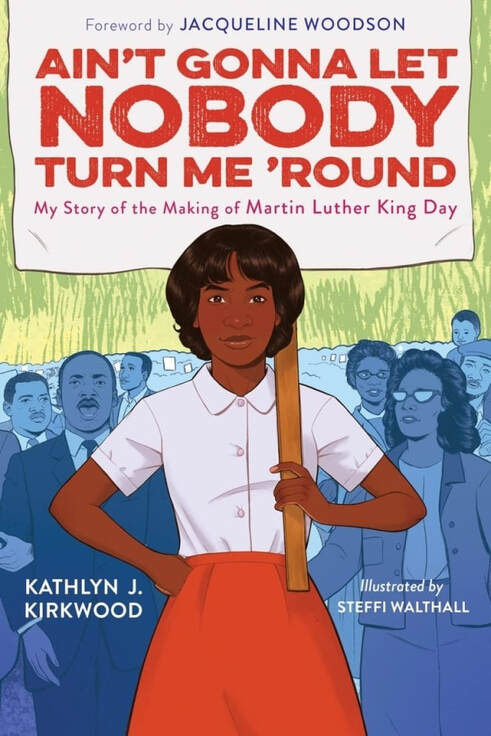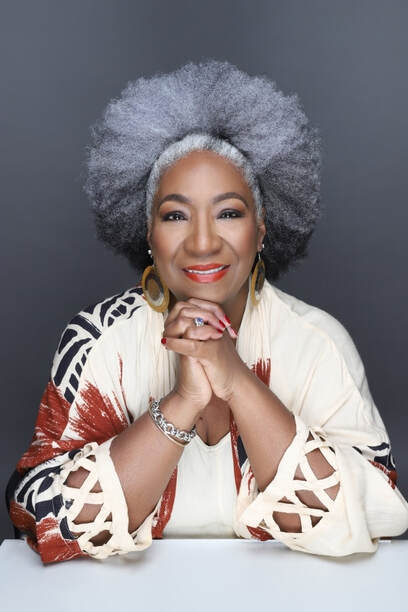|
Interview by Alliah L. Agostini I had the pleasure to interview Kathlyn J. Kirkwood, debut author of middle grade memoir, Ain’t Gonna Let Nobody Turn Me ‘Round: My Story of the Making of Martin Luther King Day. Ms. Kirkwood shares more about deciding to tell her story, some surprising tidbits about the making of MLK Day, her thoughts on inspiring activism in our children, and more. Collectively, your story and book were decades in the making. How does it feel to finally be able to share your story with the world? WONDERFUL! I feel wonderful and eternally grateful that I am able to share not just my story, but really the story of millions of unknown foot soldiers who have given of their time, energy, money, and bodies to effect change in the United States and across the world. You didn't always intend to write a book about your experience. How were you ultimately compelled to do so? It was a church friend, Jeanne Arradondo, who first suggested I write the book. At the time, I was presenting to teens and young adults at various workshops about my time in the Civil Rights Movement in a segment titled “How Dr. King’s Day Came to Be.” Jeanne attended one and afterwards recommended that I write a book. Even with that, it was still MANY years before I sat down to actually write it. In fact, I was working on another book—that’s still sitting on my shelf—when my first-born daughter told me that I needed to focus on what is now known as “Ain’t Gonna.” She told me I would be upset if someone else wrote my story. How did you decide to tell your story in verse? Throughout this book writing and publishing processing, I have been blessed with many mentors and angels. One of those was one of my Highlights Foundation editors, Deborah Hopkinson. After reading an early manuscript that was written in prose, she recommended that I try writing the book in verse. That was such a magical moment for Ain’t Gonna because in prose, the story wasn’t landing in the way I wanted, but once I started writing in verse, everything really clicked into place. Your book is targeted toward middle grade readers, who are a little younger than you were when you were involved in the movement, and I understand you work with 3rd and 4th graders, as well. What about this age group do you find particularly inspiring? They are still young and eager to learn and are receptive to new things. Part of what makes the Team Kirkwood Literacy Lab so much fun is watching how our kids, some of whom are dealing with very mature situations in their personal lives – homelessness, abuse, poverty – continue to have childlike wonder at experiencing new tastes, ideas, and concepts. I was so moved by some of the personal artifacts you included in the text, including your photos and the letter to persuade your parents to allow you to go to the march. When you decided to keep them, did you have an inkling these were going to be part of history? Not at all! I’ve always been one to keep records and not throw much away. When I first started writing the book, I didn’t even remember that I had these things. Both the letter to my mom and the petition in the book were found somewhat randomly—I was cleaning out the garage with my husband and happened to walk down memory lane looking at some things in my college trunk. Lo and behold, I opened a planner from decades ago and to my utter surprise and joy was the petition that can be viewed on page 74 in the book. The book contains some incredible facts about people whose involvement many probably didn't realize were so instrumental to shaping the holiday. Whose names do you think need to be better amplified as the story of making the King holiday is told? Definitely, Katie Hall. As the book describes, it was her bill proposing having MLK Day on a fixed Monday that overcame a lot of the cost-related objections. Another name is Stevie Wonder. Obviously, he’s a well-known musician and philanthropist, but I can’t tell you how many people, after reading the book, were surprised at his contribution to the cause and the role of his much- beloved “Happy Birthday.” As both an author and an educator, how would you best recommend teachers (and families) use your book as a resource? I wrote this book with my own literacy program in mind. Under my non-profit, Better B, LLC, my husband and I “bring books to life” to our kids by taking aspects of the books we read and creating interactive and sensory experiences. I wanted to make sure teachers and families would be able to do the same. The book contains a lot of historical and educational information that can serve as a launching pad for lessons around activism and legislation – I must call out the wonderful Chenjelani Whatley for the How a Bill Becomes a Law infographic – and the importance of advocating for change. This is a two-part question. You acknowledge your family's commitment to social justice and activism as part of your own inspiration to get involved in the movement, and even brought your own daughter along as you fought for the King holiday as an adult. How would you encourage families to inspire a spirit of activism amongst their children? For me, activism is part of civic duty. We owe it to each other to push for change that makes the world in which we live a better place. I would encourage families to find causes that matter to them and their children – whether it is water preservation, climate change, education, animal rights, food deserts, library funding, etc. There are so many causes out there. Helping children to understand at an early age that they can shape the world they live in is the best way to inspire long-lasting activism. And for children who are interested in activism but may not have the same level of parental interest or engagement, how would you suggest they help get involved? One of the lessons that I hope my young readers take from “Ain’t Gonna” is that activism can take many forms; they can shape what their own activism will look and feel like. With that in mind, they can get involved by learning all there is to know about a particular subject and its impact. They can share that information with family and friends. As they get older, they can talk to their parents about volunteering their time and other ways they can increase their own activism. There are likely many other people who have important narratives to share, but may not decide to write a book. How might you encourage others to see the importance of their own narratives and make sure they, too, are remembered? We all know the adage: “History is written by the victors.” It’s important for our stories to be told so that history does not forget. If people choose not to write a book, I would encourage them to share their story so that others may document it and maybe someday, someone else will write their story. Whether it be in diaries or journals, or through the passing down of an oral history, the most important part is the telling and sharing. How do you think we should best honor Dr. King both on his birthday, and in our daily lives? By adhering to two of his statements. First, “[o]ur lives begin to end the day we become silent about things that matter.” As I mentioned earlier, we have an obligation to find a cause that matters to us and work to make change for the better. We honor Dr. King when we fight for change and don’t let obstacles or fear, stop us from speaking up against injustices and wrongs that we see. This leads directly into a second quote that I think sits at the foundation of all activism: Life’s most persistent and urgent question is, “What are you doing for others?’” By changing our perspective to a focus on how we are helping others, I think we would honor Dr. King who lived this principle and ultimately made the ultimate sacrifice to a purpose and cause larger than himself. Born and raised in Memphis, Tennessee, Kathlyn J. Kirkwood is a retired college professor who now focuses on writing for children and volunteering with underprivileged third and fourth grade students in the Nashville area through her nonprofit Better B, LLC’s Literacy Lab. She has developed several innovative workshops that help young people learn about the world beyond their immediate surroundings and inspire in them a love of reading.
Visit Kathlyn online at https://www.kathlynjkirkwood.com and Instagram, @kathlyn.j.kirkwood Ain’t Gonna Let Nobody Turn Me ‘Round: My Story of the Making of Martin Luther King Day is available now in bookstores and online.
Kirstie My
1/16/2022 06:18:38 pm
Congrats to Ms. Kirkwood on your new book. Thank you for sharing your wisdom and memories. Comments are closed.
|
Archives
July 2024
Categories
All
|


 RSS Feed
RSS Feed



